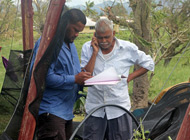March 2016

Category 5 Tropical Cyclone Winston struck Fiji on 20th February 2016. The cyclone, with winds gusting to 230 km/h (145 mph), was the strongest tropical cyclone to make landfall over Fiji on record.
Cyclone Winston’s devastating impact across Fiji rendered tens of thousands homeless, and prompted a major international humanitarian response. An estimated 350,000 people (40 percent of the nation’s population) were moderately or severely affected by the storm. Approximately 250,000 people required water, sanitation, and hygiene (WASH) assistance due to power outages and damaged infrastructure. Through the evening of 26 February, approximately 62,000 people were housed evacuation centres across the country, primarily in the Western Division.
According to a report released by the Fiji Ministry of Agriculture on 17th March, the damage to the Agriculture sector by Tropical Cyclone Winston stands at FJD 208.3million. The Ministry of Agriculture Permanent Secretary Uraia Waibuta says the damage includes crops, livestock and infrastructure but does not include the sugar sector. He said Vanuabalavu, Lomaiviti, Cakaudrove, Bua, Tailevu North and Ra were identified as the most affected areas.
Many PIFON member farmer organisations across Fiji were significantly affected in terms of infrastructure and farm losses. Various farmer organisations are working in close collaboration with the authorities related to relief efforts and planning for agricultural rehabilitation.
Despite the devastation there are emerging several important lessons related to pre and post cyclone crop mitigation as well as appropriate roles for farmer organisations in supporting post-disaster rehabilitation. PIFON hopes to work with its members to capture some of these lessons to share within the network.
